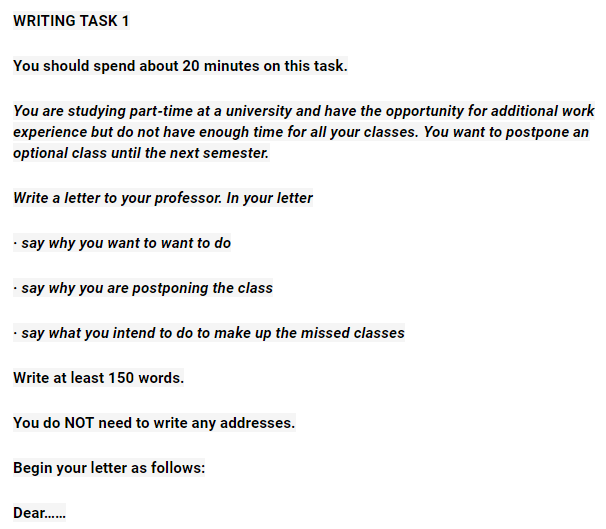A common GT IELTS task can be writing a formal Letter to Inform.
Completing the IELTS General Task 1 might seem easy, but when was the last time you sat down and wrote a letter?
- Who was it to?
- Why did you write?
- What was the purpose and
- what did you write about?
Believe it or not, people still write letters in their daily lives. What do you think most people write letters for?
Writing emails is less demanding in terms of language and structure, and so IELTS General Training questions are there to display to display the language and structuring ability of the test candidate.
The last time I wrote a complete letter, rather than an email, was last year.
It was a letter of complaint to an insurance company.
I had to say what had happened and why I was dissatisfied with the service. I also asked for a refund.
I remember it took quite a long time to complete.
So don’t worry if you think IELTS General Task 1 is a challenge.
In this post we will learn the structure and vocabulary needed to complete task and answer the question to get the highest score in task achievement.
IELTS General Training
Exam task – Writing a letter to inform
Exam focus – General Training Writing Task 1
In this post, I am going to give you the skills for to construct a letter to inform;
This will help your approaches to planning a letter and also make sure you’re using the appropriate language and organisation.
Introduction – Recognising types of Letters
Learn how to write an email to your university professor.
Here is the question

Remember you must answer all three prompts in order to get Band 5 or above – This means at least three paragraphs in your letter.
Task 1
In order to prepare for you to use the best language, do the exercises I have prepared below.
Preparation task
Match the vocabulary (1–6) with the more formal way of saying the same thing (a–f).
| Vocabulary | More formal vocabulary |
| 1. …… at the moment
2. …… a problem 3. …… to tell you 4. …… talk about it more 5. …… worried 6. …… to ask for |
a. to inform you
b. to request c. an issue d. concerned e. currently f. discuss the matter further |
Reading text: An email to your class tutor
Dear Professor Richards,
1) I am writing to inform you that, unfortunately, I am unable to continue to attend the Spanish as an additional language course this term/semester. I would like to request permission to defer as I understand that this is only possible with your approval.
2) The issue is that I am currently doing an internship with HSCB Corporation. It started in July and will continue until the end of the term/semester. The internship takes up 25 hours per week and I am concerned that it does not leave me with enough time to study. I have already asked if I can reduce my hours at HSCB, but this is not possible.
3) With your approval, I could take Spanish next semester instead. I realise that this would mean a heavier workload than usual next semester, but I assure you that by that time I would be able to manage my time and keep up with classes.
4) Thank you for considering my request and I would be happy to come in and discuss the matter further.
Regards, Jenny Liu
Task 2
Which paragraphs perform which prompt in the question?
| Paragraph | Prompt |
|
1. 2. 3. 4.
|
a. conclude
b. discuss c. suggest d. inform e. request |
It’s a good idea to follow the prompts in the question and also think about the audience you are writing to.
- Use the person’s job title if you don’t know their name (e.g. Dear Admissions Tutor, Dear Marketing Manager, Dear Customer Relations Manager).
- Start your email by clearly giving your reason for writing and then explain the issue.
- Working people are busy, so it’s important to be make the letter short and to the point, include only the most important information.
- If you have a solution to the problem, suggest it and politely ask if it can be If you don’t, politely request for help or a suggestion.
- Finish by thanking the person for their assistance and offering to discuss the matter further if needed.
- Regards, (also With regards, Best regards, or Kind regards,) is a more friendly-sounding sign-off than Yours sincerely, but it is still formal enough to be appropriate.
Task 3
Reading text: An email to your class tutor
Dear Professor Richards,
I am writing to inform you that, unfortunately, I am unable to continue to attend the Spanish as an additional language course this term/semester. I would like to request permission to defer as I understand that this is only possible with your approval.
The issue is that I am currently doing an internship with HSCB Corporation. It started in July and will continue until the end of the term/semester. The internship takes up 25 hours per week and I am concerned that it does not leave me with enough time to study. I have already asked if I can reduce my hours at HSCB, but this is not possible.
With your approval, I could take Spanish next semester instead. I realise that this would mean a heavier workload than usual next semester, but I assure you that by that time I would be able to manage my time and keep up with classes.
Thank you for considering my request and I would be happy to come in and discuss the matter further.
Regards, Jenny Liu
Are these sentences true or false?
| Answer | ||
| 1. The email follows the structure of introduction, main point, what you want to happen next. | True | False |
| 2. The tone is formal. | True | False |
| 3. The email includes unnecessary details. | True | False |
| 4. The writer suggests a solution to their problem. | True | False |
| 5. The closing phrase means there is an obligation to discuss the subject. | True | False |
| 6. Regards is for use between friends in emails. | True | False |
Task 4
Circle the best answer.
| 1. | I am writing to you of a change of address. | ||
| a. inform | b. warn | c. instruct | |
| 2. | I sent an email last week to information about the Philosophy course. | ||
| a. demand | b. ask | c. request | |
| 3. | I seven classes before I had to take time off for sickness. | ||
| a. assisted | b. attended | c. appeared | |
| 4. | I am about managing the workload of the course at the same time as my other responsibilities. | ||
| a. bothered | b. concerned | c. upset | |
| 5. | I think one has been the difficulty in accessing the library as a distance student. | ||
| a. mess | b. subject | c. issue | |
| 6. | , family circumstances mean it is difficult for me to study in the evenings. | ||
| a. Currently | b. Actually | c. Momentarily | |
| 7. | I would like to request your for a change of timetable. | ||
| a. toleration | b. promise | c. approval | |
| 8. | I would be happy to come in and it with you. | ||
| a. discuss | b. argue | c. dispute | |
Task 5
Write one word in each gap to complete the email.
(1)……………………………… Professor Vazquez,
Many thanks (2)……………………………… your feedback on my assignment.
I’m writing (3)……………………………… inform you that, unfortunately, I have had (4)……………………………… postpone my current module until next term. I requested approval (5)……………………………… the English department (6)……………………………… this and I have (7)……………………………… permission, as long (8)……………………………… I am able to catch up with the work.
I (9)……………………………… very much enjoyed your module and I hope (10)……………………………… be able to rejoin the course (11)……………………………… January, after (12)……………………………… small operation on my foot. I wanted to explain (13)……………………………… situation and to assure
(14)……………………………… that I will use my recovery time to keep (15)……………………………… with the reading for the course.
I (16)……………………………… be happy (17)……………………………… come in and discuss the matter further.
Kind (18)……………………………… ,
Jenny Lui
Discussion
What are some good and bad reasons for giving up a course? Do you think this was a good reason and response to the prompts below?
Remember you can write over the 250 words limit. This is a minimum, not a maximum target.
The Letter below is a Band 9 example because….
- It answers all three prompts (inform, discuss, suggest) and expands the details sufficiently and appropriately
- The tone is appropriate for the task (with your approval, thank you for considering)
- It structures the letter, paragraphing is focussed sufficiently and appropriately.
- Topic sentences clearly link paragraphs together ( I am writing to inform, The issue is that , With your approval I could take Spanish next semester )
- It uses the formal language required for the task i.e, writing to a professor (I am writing to inform, I would like to request )
- It shows an awareness of style and a wide range of vocabulary
- The tone of the concluding sentence is clear and appropriate ( Thank you for considering, I would be happy, discuss the matter further )
Dear Professor Richards,
I am writing to inform you that, unfortunately, I am unable to continue to attend the Spanish as an additional language course this term/semester. I would like to request permission to defer as I understand that this is only possible with your approval.
The issue is that I am currently doing an internship with HSCB Corporation. It started in July and will continue until the end of the term/semester. The internship takes up 25 hours per week and I am concerned that it does not leave me with enough time to study. I have already asked if I can reduce my hours at HSCB, but this is not possible.
With your approval, I could take Spanish next semester instead. I realise that this would mean a heavier workload than usual next semester, but I assure you that by that time I would be able to manage my time and keep up with classes.
Thank you for considering my request and I would be happy to come in and discuss the matter further.
Regards, Jenny Liu
Finally….
You have to write a minimum of 150 words, include relevant details and use appropriate language and style so that the purpose of your letter is clear to the reader.
There is no choice of questions, you are given the task and you need to answer all the prompts.
More IELTS General Posts
I’m Jonathan, an online-IELTS preparation specialist.
I help IELTS students to achieve the IELTS score they need with clear teaching, courses, training and feedback.

I have taught IELTS and University English in more than a dozen universities and schools around the world.
I’m a parent, traveller and passionate about language teaching and helping students achieve their dreams.
Whilst living in Austria or working in Asia, I run IELTS courses to help students get to where they want to be.
If you are serious about IELTS, connect with me to see how I can help you.


